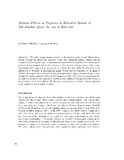| dc.contributor.author | Chilisa, B. | |
| dc.date.accessioned | 2012-11-08T07:32:07Z | |
| dc.date.available | 2012-11-08T07:32:07Z | |
| dc.date.issued | 2002 | |
| dc.identifier.citation | Chilisa, B. (2002) National policies on pregnancy in education systems in Sub-Saharan Africa: the case of Botswana, Gender and Education, Vol. 14, No. 1, pp. 21-35 | en_US |
| dc.identifier.uri | http://hdl.handle.net/10311/1040 | |
| dc.description.abstract | The article critiques pregnancy policies in the education systems in sub-Saharan Africa. Policies discussed are divided into expulsion, re-entry and continuation policies. Arguing from the standpoint of theories of oppression, it is postulated that expulsion policies symbolise direct violence against girls who become pregnant and are more common in those countries with poor human rights records. Continuation and re-entry policies are prevalent in countries that have ratified the Convention on the Elimination of all Forms of Discrimination Against Women and the Convention on the Rights of Children. It is argued that re-entry policies also violate girl mothers’ right to education through a retreat ideology that requires temporary withdrawal of the pregnant girl from school. Moreover, gender inequalities are built into the policies and supported by traditional and institutional ideologies that make re-entry of the girl mother into the school difficult. The Botswana re-entry policy is reviewed to illustrate difficulties in the readmission of girl mothers to school. | en_US |
| dc.language.iso | en | en_US |
| dc.publisher | Taylor & Francis, http://www.tandf.co.uk/journals | en_US |
| dc.subject | Pregnancy in education | en_US |
| dc.subject | Pregnancy in school | en_US |
| dc.title | National policies on pregnancy in education systems in Sub-Saharan Africa: the case of Botswana | en_US |
| dc.type | Published Article | en_US |
| dc.link | http://dx.doi.org/10.1080/09540250120098852 | en_US |

